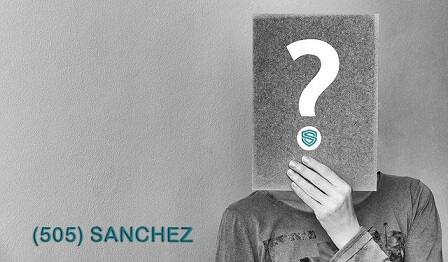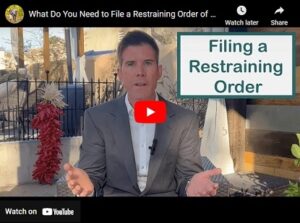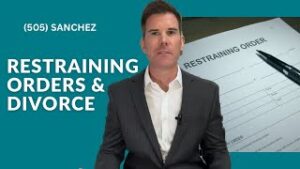
If you are subject to a restraining order in Albuquerque, New Mexico, you may be wondering if it will result in your eviction from your home.
A restraining order can limit your access to certain areas or individuals. However, a restraining order does not necessarily mean that you will be formally evicted from your residence.
For instance, a Temporary Restraining Order (TRO), usually prevents the alleged abuser from coming within 100 yards of the victim. Consequently, when the two parties are living together, the TRO can prevent the alleged abuser from returning to the home.
Nevertheless, the TRO and Order of Protection do not formally evict a person from one’s home. Instead, the distance restriction can prevent both sides from living in the same home.
Let’s explore how a restraining order can prevent both parties from living in the same home.
HOW RESTRAINING ORDERS CAN FORCE YOU OUT OF YOUR HOME DURING DIVORCE
At times, during a divorce, a restraining order is requested to force one spouse out of the marital home. This happens when a Temporary Restraining Order prevents the alleged abuser from coming within 100 yards of the alleged victim.
At times, the two sides live in the same house.
When this happens, the alleged victim may remain in the home. Alternatively, the alleged victim may flee the marital home.
When the alleged victim stays in the marital home, the alleged abuser may be prevented from returning to the home. Sometimes, the alleged abuser may be violating the TRO by returning to the marital home.
In some cases, this enables one spouse to potentially file a baseless restraining order. In doing so, the party may use the restraining order process to effectively force the other spouse out of the marital home.
However, a TRO that forces one spouse out of the marital home does not impact the spouse’s community property claim. In other words, a spouse that is forced from the home still has an unchanged community interest in the home.
Nevertheless, sometimes spouses abuse the restraining order system to force one spouse out of the home. Moreover, once the spouse is out of the home, the remaining spouse may change the locks to prevent re-entry.
In this situation, even if the restraining order is dismissed, the spouse may be unable to access the home because the locks have been changed.
Check out this video helps you understand the basics of a restraining order, and how to get one in New Mexico.
RESTRAINING ORDERS CAN IMPACT RENTAL LEASE
An Albuquerque protective order can also impact a tenant’s lease. For example, when both sides live in an apartment complex, or community, a restraining order may violate the lease’s terms.
When this happens, a restraining order of protection can potentially force one party out of the apartment or complex.
This doesn’t necessarily result in a legal eviction. However, the restraining order can violate the lease’s terms – forcing one party out of the residence.
Ultimately, each restraining order case is different. Your unique case turns on your unique lease or rental agreement.
Consequently, it is essential to speak with an experienced restraining order attorney before jumping into court. Failing to speak with a highly qualified domestic violence and restraining order attorney can create unintended consequences.
In turn, these unintended consequences can haunt you and your rights moving forward.
This video provides more information on how a protective order can impact your divorce case.
CAN I BE EVICTED FROM MY HOME IF I GET A RESTRAINING ORDER AGAINST MY PARTNER?
Usually, the person requesting the restraining order is not forced out of the home. Instead, the person requesting the restraining order receives an order that prevents the other party from coming within 100 yards of the alleged victim.
At times, the person requesting a restraining order chooses to leave the shared home or apartment. Possibly the person flees to a parent or friend’s home.
When this happens, the alleged abuser can remain in the home or apartment without violating the protective order.
In other words, filing a restraining order will not force you out of your own home – unless you choose to leave. When you choose to stay in your home, the temporary order likely will prevent the alleged abuser from returning to your home.
WHAT HAPPENS IF A RESTRAINING ORDER FORCES ME OUT OF MY HOME?
If a restraining order is issued against you and it requires you to leave your home, you must comply with the order. Failing to follow the order could result in criminal charges being filed.
This means you will have to find alternative housing arrangements until the order is either lifted, dismissed, or modified.
It is important to follow the terms of the restraining order to avoid any legal consequences or criminal charges.
Moreover, violating your protective order can have collateral consequences. For example, violating your order can potentially impact your uncontested divorce or child custody case.
Do you have concerns about how a restraining order impacts your divorce, child custody, or housing situation? If so, you should consult with a lawyer or a domestic violence advocate for guidance.
CAN I BE FIRED FROM MY JOB BECAUSE OF A RESTRAINING ORDER?
In New Mexico, a protective order can also impact your employment. In some situations, a restraining order being entered can result in you losing your job.
You see, protective orders can impact your security clearance and gun rights. Consequently, a protective order can significantly impact your job if you lose your required security clearance. Moreover, an order of protection could cause you to lose your job if you are no longer able to own or possess a firearm.
So, you need to take your case seriously. Even when the claims seem bogus, it is essential to speak with a qualified attorney.
A seasoned lawyer can help you understand how an order being entered against you can impact your rights. These rights include your home rights, and employment.
Talk with Albuquerque’s top restraining order attorney. For over a decade, Sanchez has handled complex and contested order of protection cases across New Mexico.
Often, these cases involve contested divorce, child custody, or domestic violence.
Call (505) SANCHEZ today and speak with a top Albuquerque divorce and family law attorney.

Restraining Order evict force from home in New Mexico









